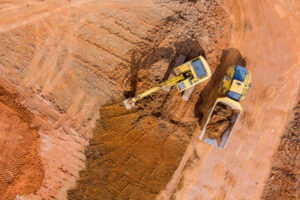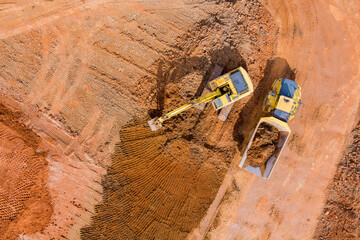Taking on an excavation project involves more than just digging through dirt. Excavating contractors offer a wide range of essential services that help construction projects move from the drawing board to reality.
From laying the foundation for new buildings and roads to managing underground utilities safely, these experts are instrumental in making your property work. Let’s dive into some of the specific services they provide. Visit bartexcavationllc.com to learn more.
The first step in laying the foundation for any construction project is meticulous site preparation. Excavation contractors handle a variety of services to prepare construction sites for the construction process, from clearing and digging to grading land and managing underground utilities. Their expertise ensures that construction activities proceed smoothly from start to finish and that projects are built on solid ground.
During site preparation, an excavating contractor clears and preps the site by removing vegetation, debris, and any other obstructions. They may also install critical infrastructure and perform soil testing to determine the condition of the land and identify potential issues that could affect the integrity of future buildings. They use heavy machinery, like bulldozers, to shape the land and ensure that it is leveled and sloped appropriately for drainage and to meet building specifications.
Once a buildable lot is established, an excavating contractor can dig trenches for underground utility lines to prevent flooding and manage water flow. Once excavation is complete, they may then backfill the area and regrade the land to achieve the desired elevations outlined in the construction plans. They may also implement erosion control measures and environmental compliance programs to minimize pollution and preserve biodiversity.
When it comes to constructing a residential building, an excavating contractor will install the necessary utilities and infrastructure to support the structure once it is constructed. This includes installing sewage systems, water mains, and electrical wires that are then buried to minimize the footprint of the site and protect against surface erosion.
In many cases, the groundwork for construction may require the removal of existing structures or structures that are unsafe or in poor repair. This requires specialized equipment that is often operated by an experienced excavating contractor to safely and efficiently dismantle or remove existing infrastructure without disrupting the surrounding environment.
As excavation and site preparation services become increasingly important, the need for qualified professionals is growing rapidly. By choosing an excavating contractor that is licensed and certified, as well as one with extensive experience and a comprehensive range of services, you can be confident that your next construction project will start off on solid footing.
Excavation
Whether you’re planning an underground swimming pool or a brand-new roadway, excavation is a crucial step in bringing your construction project from conception to reality. As the first professionals to arrive on construction sites, excavating contractors are responsible for clearing and digging land to carve out space for building foundations and essential utilities, setting the stage for construction activities to follow. The right contractor will have the skills and equipment necessary to work safely, effectively and efficiently, ensuring that your project is successful from start to finish.
Using a variety of heavy machinery like front-end loaders, backhoes, bulldozers and trenchers, an excavation contractor digs holes according to precise specifications. They also perform soil tests to ensure that the underlying soil is stable and can support the weight and structure of any future development. In addition, they manage underground utility locations and other important infrastructure with utmost care and precision to avoid costly damage or disruption.
When you hire a reputable excavation contractor, they will take the time to fully understand your construction site and its specific requirements. They will identify potential challenges, such as soil consistency and the presence of underground utilities, and work to anticipate them with detailed planning and advanced tools like ground-penetrating radar. This prevents costly missteps and allows crews to work safely around existing infrastructure while minimizing delays.
In some cases, excavation may uncover historical artifacts that need to be carefully moved and stored, or other unanticipated issues that require expert solutions. Skilled excavation contractors are experienced in resolving unforeseen challenges and will provide you with innovative solutions that address both your short- and long-term needs.
Many property owners don’t realize that their homeowner’s insurance policies don’t cover damages caused by excavation work. A skilled excavation contractor will carry the proper liability coverage to protect their clients and their own investments, as well as any employees or subcontractors working on-site. This coverage is critical, as improper excavation techniques can result in costly structural or functional problems down the road. The right contractor will be able to explain your insurance options and provide you with a comprehensive excavating proposal that includes estimated costs for all services.
Integrating Vital Infrastructure
Using sophisticated equipment and a deep understanding of the ground, excavating contractors lay the foundations for construction projects from start to finish. This work transforms landscapes from raw patches of dirt into bustling construction sites, boosting the stability, efficiency, and success of building endeavors across communities. The services they offer range from site planning to digging and grading land, laying the crucial groundwork for a project from the ground up.
One of the most important aspects of excavation is integrating vital infrastructure into the construction site. This involves digging trenches and spaces for utilities like water, sewage, electricity, and gas. Contractors are also responsible for laying pipe for these systems, connecting them to their sources and making sure that they’re properly integrated into the new structure.
In addition to integrating infrastructure, contractors must also make sure that the excavation process is carried out safely and effectively. This includes inspecting the site and determining what areas are safe to dig, as well as marking off boundaries with physical barriers and establishing procedural prevention and protection measures for workers. It’s also important to be aware of existing utility lines, as accidentally damaging them can result in significant disruptions and additional costs.
Some sites may have contaminated soil, and excavating contractors are responsible for identifying and managing this issue. They often employ specialized remediation techniques such as soil washing or encapsulation to ensure that the surrounding environment is free from environmental hazards.
Lastly, excavation contractors are responsible for ensuring that the construction site is ready for the next phases of development. They grade and level the area to ensure that it meets specifications, such as slope angles and ground elevations, and they use laser guidance for precise paving. This is essential for preventing future issues such as flooding or structural damage. In addition, they utilize heavy machinery such as bulldozers and track dumpers to prepare the site, moving earth quickly and efficiently with precision and accuracy.
Soil Remediation
When soil has been contaminated by hazardous chemicals, oil waste, or other substances, it’s important to remove the material from the site. This prevents contaminants from leaching into groundwater and other parts of the property, and it also helps to ensure that the contamination is entirely removed from the land. Excavation contractors can dig up large quantities of contaminated soil, and they can even handle more extensive remediation techniques, like bioremediation or chemical oxidation.
Contaminated soil excavation is generally limited to shallower depths of less than 20 feet, but deeper excavation can be accomplished if the contamination extends below the groundwater table. If this is the case, a slurry wall may be required to contain the contaminants, and on-site groundwater treatment may be necessary.
Once the contaminated soil is removed, it’s important to dispose of it properly to protect the environment and anyone who might come into contact with it in the future. An experienced excavation contractor can help with this process, and they can also take steps to minimize the impact of construction on surrounding wildlife and waterways.
An excavation company can also clear existing structures and vegetation, which is often required before new infrastructure is installed. This includes utility trenching, which involves digging for pipes and other infrastructure like power lines, sewers, and gas lines. Erosion control measures are also frequently included in the excavation process, and these can include everything from silt fences to hydroseeding.
Finally, excavation contractors can prepare the site for landscaping and other finishing work by installing drainage channels and grading the surface of the ground. This is especially important for residential lots, where rainwater can cause severe damage to asphalt if it’s not directed away from buildings like homes. Drainage channels can also prevent flooding and other environmental problems that result from the accumulation of sediment in nearby streams and rivers.
